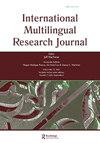Translanguaging through the lens of social justice: unpacking educators’ understanding and practices
IF 2.1
1区 文学
Q2 EDUCATION & EDUCATIONAL RESEARCH
引用次数: 0
Abstract
ABSTRACT This article focuses on translanguaging, which has been posited as a language practice, pedagogical tool, and lens that values individuals’ linguistic resources and deems them valuable. Scholars have postulated that translanguaging is rooted in social justice, as it aims to address social inequities among emergent bilinguals. Yet, do educators address social justice objectives when using translanguaging strategies, or do they merely conceptualize translanguaging as a pedagogical tool in teaching and learning as a means to assimilate and help students succeed within an unjust system rather than changing the system? Using a historical review of the literature and data gathered through an online survey, this study sought to examine: what understanding do educators hold about the connection between translanguaging and social justice? And in what ways, if any, do these understandings align with their teaching practices? The findings from our study show that only a few educators proposed a connection between translanguaging and social justice. Moreover, even those educators who suggested a connection between the two shared little evidence of the enactment of this relationship in their practice. This article discusses these observations in the context of the education of emergent bilingual students and the development of critical awareness among their educators.社会正义视角下的译语:解读教育者的理解与实践
摘要本文关注的是跨语言,它被认为是一种语言实践、教学工具和透镜,重视个人的语言资源并认为它们有价值。学者们认为,跨语言现象植根于社会正义,因为它旨在解决新兴双语者之间的社会不平等问题。然而,教育工作者在使用跨语言策略时是为了实现社会正义目标,还是仅仅将跨语言概念化为教学和学习中的一种教学工具,作为同化和帮助学生在不公正的制度中取得成功的手段,而不是改变制度?本研究通过对通过在线调查收集的文献和数据进行历史回顾,试图检验:教育工作者对跨语言与社会正义之间的联系有什么理解?这些理解在哪些方面(如果有的话)与他们的教学实践相一致?我们的研究结果表明,只有少数教育工作者提出了跨语言与社会正义之间的联系。此外,即使是那些提出两者之间存在联系的教育工作者,也几乎没有证据表明他们的实践中存在这种关系。本文结合新兴双语学生的教育和他们的教育者批判性意识的发展来讨论这些观察。
本文章由计算机程序翻译,如有差异,请以英文原文为准。
求助全文
约1分钟内获得全文
求助全文
来源期刊
CiteScore
4.10
自引率
4.80%
发文量
19
期刊介绍:
The International Multilingual Research Journal (IMRJ) invites scholarly contributions with strong interdisciplinary perspectives to understand and promote bi/multilingualism, bi/multi-literacy, and linguistic democracy. The journal’s focus is on these topics as related to languages other than English as well as dialectal variations of English. It has three thematic emphases: the intersection of language and culture, the dialectics of the local and global, and comparative models within and across contexts. IMRJ is committed to promoting equity, access, and social justice in education, and to offering accessible research and policy analyses to better inform scholars, educators, students, and policy makers. IMRJ is particularly interested in scholarship grounded in interdisciplinary frameworks that offer insights from linguistics, applied linguistics, education, globalization and immigration studies, cultural psychology, linguistic and psychological anthropology, sociolinguistics, literacy studies, post-colonial studies, critical race theory, and critical theory and pedagogy. It seeks theoretical and empirical scholarship with implications for research, policy, and practice. Submissions of research articles based on quantitative, qualitative, and mixed methods are encouraged. The journal includes book reviews and two occasional sections: Perspectives and Research Notes. Perspectives allows for informed debate and exchanges on current issues and hot topics related to bi/multilingualism, bi/multi-literacy, and linguistic democracy from research, practice, and policy perspectives. Research Notes are shorter submissions that provide updates on major research projects and trends in the field.

 求助内容:
求助内容: 应助结果提醒方式:
应助结果提醒方式:


